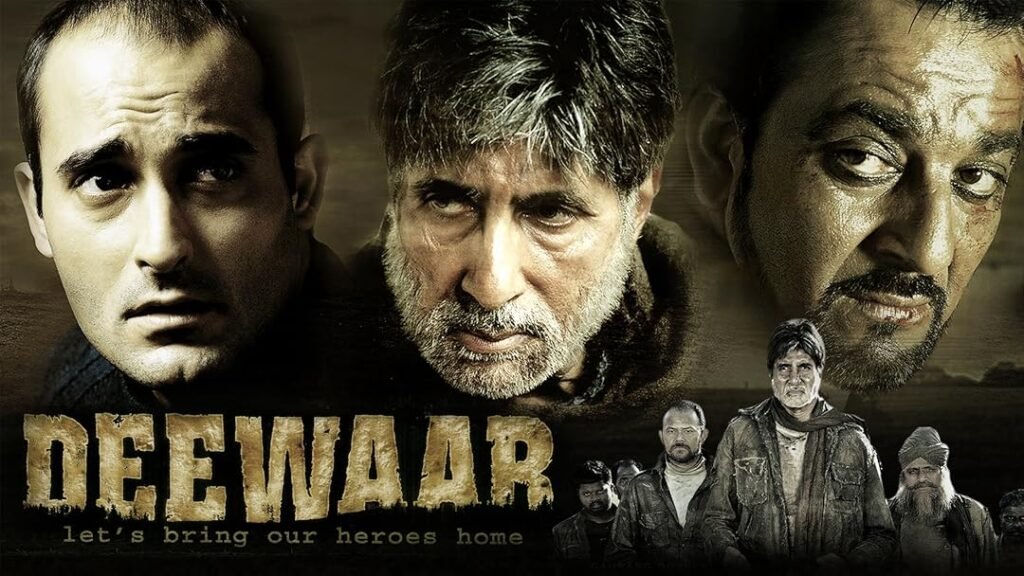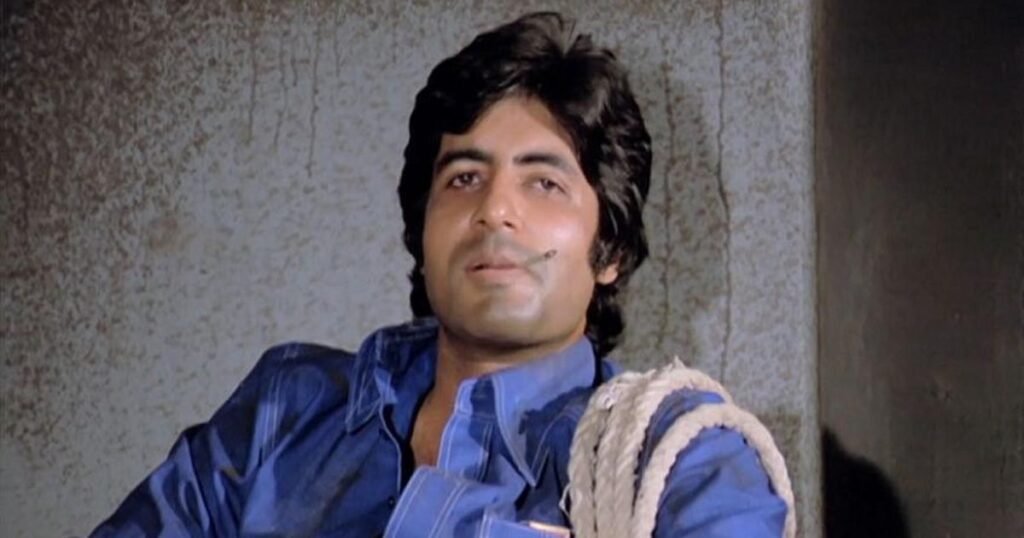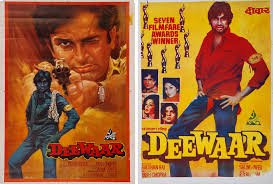Deewaar: Exploring the Legacy of an Iconic Film
Table of Contents
History of Deewaar
Explore the impact of “Deewaar,” a classic Bollywood film that reshaped Indian cinema, focusing on its themes, characters, and cultural significance.
“Deewaar,” released in 1975, is a landmark Hindi film directed by Yash Chopra and produced by Gulshan Rai. Often hailed as one of the greatest Indian films, it played a pivotal role in redefining the “angry young man” archetype in Indian cinema, famously portrayed by Amitabh Bachchan. The film not only became a massive commercial success but also left a lasting impact on Indian pop culture and cinema.

Origins and Production
The film’s screenplay was crafted by Akhtar Romani, drawing inspiration from the socio-economic conditions of India in the 1970s. At a time when the nation was grappling with issues like unemployment, corruption, and a growing divide between the rich and the poor, “Deewaar” emerged as a reflection of societal frustrations.
Yash Chopra’s direction was complemented by the powerful performances of the lead actors, particularly Amitabh Bachchan and Shashi Kapoor, who brought depth and complexity to their characters. The film’s music, composed by the duo Laxmikant-Pyarelal, became an integral part of its narrative, enhancing emotional moments and engaging the audience further.
Cultural Impact
Upon its release, “Deewaar” resonated deeply with audiences, capturing the zeitgeist of the era. It addressed themes that were relevant to the common man, making it a significant cinematic experience. The film’s exploration of familial bonds, moral dilemmas, and the struggle against oppression struck a chord, particularly with the youth of that time.
Legacy and Recognition
“Deewaar” not only garnered commercial success but also received critical acclaim. It was nominated for several awards and has since been featured in various lists of the greatest Indian films. Its influence can be seen in subsequent Bollywood films that adopted similar themes of rebellion, family loyalty, and moral conflict.
Story Overview
Plot Summary
“Deewaar” tells the poignant story of two brothers, Vijay (Amitabh Bachchan) and Ravi (Shashi Kapoor), who grow up in the slums of Mumbai. Their father, a former police officer, struggles to find work after being dismissed from the force due to corruption. The family faces dire poverty, which shapes their destinies in profound ways.
Vijay, hardened by his experiences and determined to provide for his family, takes a different path, turning to a life of crime. Meanwhile, Ravi, who aspires to uphold justice, becomes a police officer. The brothers’ contrasting paths lead to inevitable conflict, as Vijay’s rise in the underworld puts him at odds with Ravi’s pursuit of law and order.
Themes of Caste and Social Roles
While “Deewaar” does not explicitly address caste, it highlights the struggles of the lower and middle classes. The characters’ decisions and their resulting conflicts reflect the societal expectations and roles imposed on them. The film showcases how socio-economic status influences relationships and moral choices.
Key Features of Deewaar
| Key Features of Deewaar | Description |
|---|---|
| Genre | Action, Drama |
| Director | Yash Chopra |
| Lead Actors | Amitabh Bachchan, Shashi Kapoor |
| Release Year | 1975 |
| Music | Composed by Laxmikant-Pyarelal |
| Cinematography | By Munir Khan |
| Screenplay | Akhtar Romani |
| Themes | Family, Betrayal, Class Struggle |
| Box Office | Major commercial success |
Character Analysis
- Vijay Verma (Amitabh Bachchan): A complex character who embodies the struggle against systemic injustice. His transformation from a caring son to a hardened criminal highlights the impact of societal neglect and personal choices.
- Ravi Verma (Shashi Kapoor): Represents the moral compass of the film. His journey as a police officer striving to uphold justice contrasts sharply with Vijay’s descent into crime, illustrating the dichotomy of law versus lawlessness.
- Mrs. Verma (Nirupa Roy): The emotional anchor of the family, her character embodies the struggles of a mother trying to hold her family together in the face of adversity.
Advantages of Deewaar
- Cultural Relevance: The film addresses societal issues that remain pertinent, making it a timeless piece of art.
- Character Development: Strong character arcs and performances that offer depth and relatability, allowing viewers to connect with their struggles.
- Memorable Music: Iconic songs that enhance the narrative, creating an emotional resonance that lingers long after viewing.
- Cinematic Techniques: Innovative storytelling and visual techniques that paved the way for future filmmakers in Indian cinema.
- Social Commentary: The film serves as a critique of the socio-political landscape of the time, reflecting the aspirations and frustrations of the common man.
FAQ
What is the main theme of Deewaar?
The main themes revolve around familial loyalty, social injustice, and the moral dilemmas faced by individuals in a corrupt society.
Who directed Deewaar?
Deewaar was directed by Yash Chopra, a prominent figure in Indian cinema known for his romantic dramas and impactful storytelling.
How did Deewaar influence Indian cinema?
Deewaar introduced the “angry young man” trope and set a benchmark for films dealing with social issues, influencing many subsequent filmmakers and narratives.
What role does music play in Deewaar?
The music in Deewaar enhances the emotional depth of the story, with memorable songs that have become classics in Indian cinema.
Is Deewaar still relevant today?
Yes, Deewaar’s exploration of class struggles and moral choices remains relevant, making it a subject of study in discussions about Indian society.
What impact did Deewaar have on Amitabh Bachchan’s career?
Deewaar solidified Amitabh Bachchan’s status as a superstar in Bollywood, establishing him as the face of the “angry young man” persona that became iconic in the 1970s.
How does Deewaar compare to other films of its era?
Deewaar stands out for its gritty realism and emotional depth, contrasting with the more romantic and escapist films of its time, thus marking a significant shift in narrative style.
Are there any notable dialogues from Deewaar?
Yes, the film is famous for its powerful dialogues, including “Mere paas maa hai,” which captures the essence of familial loyalty and emotional weight in a few words.
What is the significance of the film’s title, “Deewaar”?
The title, meaning “Wall,” symbolizes the barriers that the characters face—be it societal, familial, or moral—that ultimately lead to conflict and resolution.

Conclusion
“Deewaar” stands as a pillar of Indian cinema, with its rich storytelling, strong performances, and profound themes. It captures the essence of societal struggles while highlighting the complexities of human relationships. As a film, it continues to inspire filmmakers and audiences alike, reinforcing its status as a classic that transcends time.
Through its engaging narrative and powerful characters, “Deewaar” not only entertains but also provokes thought and discussion about the socio-economic issues that affect society today. Its legacy endures, reminding us of the power of cinema to reflect and challenge societal norms.
Future Perspectives
The impact of “Deewaar” can still be felt in contemporary cinema, as filmmakers continue to explore themes of social justice, familial bonds, and moral dilemmas. The film serves as a timeless reminder of the enduring struggles faced by individuals in society, making it a vital piece of cultural history.
For More Information, Visit https://filmitalks.in/
